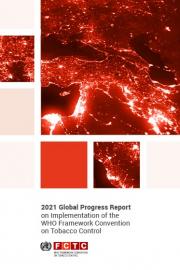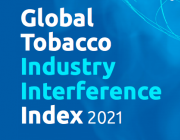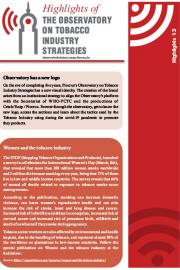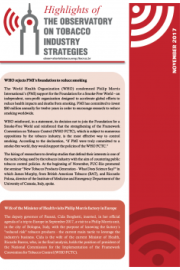Adding flavors to tobacco products makes them more appealing to young people and harder to quit. The tobacco industry develops enticing flavored products, markets them to targeted groups and prevents and weakens flavor bans. Despite objections from the tobacco industry, countries have begun to implement flavor bans. Strong policies can maximize the effectiveness of tobacco flavor bans.

Este Relatório de Progresso Global de 2021 sobre a Implementação da Convenção-Quadro da OMS sobre O Controle do Tabaco é o nono de uma série de relatórios elaborados desde a entrada em vigor do Convenção-Quadro da OMS para o Controle do Tabaco (OMS FCTC) em 27 de fevereiro de 2005. O relatório foi desenvolvido enquanto a comunidade global lutava contra a doença coronavírus 2019 (COVID-19), a pandemia mais séria em mais de um século. Está sendo publicado em um momento em que o tabaco mais uma vez se mostrou mortal, não apenas por si só, mas também aumentando a morbimortalidade relacionada ao COVID-19, que é causada pela severa síndrome respiratória aguda coronavírus 2. A pandemia de COVID-19 afetou a saúde sistemas e economias em todo o mundo, com muitos hospitais e clínicas lutando para sustentar operações durante uma pandemia que ceifou mais de 4,3 milhões de vidas em todo o mundo.
2021 GLOBAL Progress Report: on Implementation of the WHO Framework Convention on Tobacco Control. Framework Convention
on Tobacco Control, [s.l.]. 2021. 196p.

Enquanto os governos têm o poder de restringir regulamentos da indústria, infelizmente, o oposto parece ter acontecido nestes tempos difíceis. No muitos países, os governos têm protegido e até promoveu a TI. O tabaco já é o responsável por cerca de 8 milhões de mortes anuais em todo o mundo1 e saúde e as perdas de produtividade custam cerca de US $ 1,4 trilhão todos os anos. No entanto, os governos foram persuadidos a acomodar as demandas e lobby deste prejudicial indústria e aceitar sua caridade, conforme mostrado no Global Índice de Interferência da Indústria do Tabaco 2021 (o Índice).
GLOBAL Tobacco Industry Interference Index 2021. Global Center for Good Governance in Tobacco Control, Thialand, 2021, nov. 2021. 72p.
In September 2015, representatives of the 193 UN member states acknowledged that eradicating poverty in all off its forms and dimensions, especially extreme poverty, is the greatest global challenge and an indispensable requirement for sustainable development. By adopting the document “Transforming our World: The 2030 Agenda for Sustainable Development” (A/70/L.1)1 , the countries resolved to take action to promote sustainable development in the next 15 years pledging “that no one will be left behind ». The 2030 Agenda is a plan of action designed to deal with areas that are critical to both humanity and the planet. It includes actions aimed to the wellbeing of people, the environment, bringing about peace and prosperity.
TURCI, Silvana Rubano Barretto. SILVA, Vera Luiza da Costa e. Interference of the tobacco industry in the 2030 Agenda. CETAB, Rio de Janeiro, 26 out 2021. Acesso em: 10 jul 2024.
After more than a decade of pressure from increasing government tobacco controls, a growing illicit cigarette economy and changing consumer attitudes towards smoking, South Africa's Tobacco industry was subjected to a twenty-week prohibition on the sale of all raw tobacco leaf, processed tobacco and all manufactured tobacco products under lockdown measures. This led to the industry losing significant market share to illicit cigarette sales. The industry also faced an 8% increase in excise duties and announcements of renewed government efforts to finalise further tobacco controls.

fact sheets with the topics considered outstanding in order to promote debates and decision making in the scope of tobacco control. In this edition, the following points are presented: Observatory has a new logo; women and the tobacco industry; slavery work; Cadernos de Saúde Pública and Rock in Rio and Souza Cruz are condemned for abusive advertising of tobacco products to young people.
KORNALEWSKI, Alex Medeiros; CARVALHO, Alexandre Octavio Ribeiro de; BARATA, Danielle; LEONEL, Filipe; TURCI, Silvana Rubano. Destaques do Observatório sobre as Estratégias da Indústria do Tabaco. Cetab/Ensp/Fiocruz, Rio de Janeiro, mai. 2021. Acesso em: 5 maio 2021.
The next time you go for a walk, look at the ground. How many littered cigarette butts do you see? Chances are, more than a few. Cigarette butts are the most littered item on the planet—4.5 trillion are discarded every year. While cigarette waste may be the most visible form of environmental degradation the tobacco industry contributes to, it’s only one way the industry creates lasting damage to the environment and subsequently, the people who live in it (that’s all of us—smokers and nonsmokers alike).
THE Dirt Behind Big Tobacco and the Environment. STOP, [s.l], 21 abr 2021. Disponível em: https://exposetobacco.org/news/big-tobacco-and-environment/?utm_source=m.... Acesso em: 3 jul 2024.

In this edition, the following subjects are presented: The World Health Organization (WHO) rejects the founding of Philip Morris International (PMI) to reduce smoking; Wife of the Minister of Health visits Philip Morris factory in Europe; Illegal advertising campaign of tobacco products on the Internet and São Paulo City Hall disregard request for a partnership break with the tobacco industry.
KORNALEWSKI, Alex Medeiros; CARVALHO, Alexandre Octavio Ribeiro de; BARATA, Danielle; LEONEL, Filipe; TURCI, Silvana Rubano. Destaques do Observatório sobre as Estratégias da Indústria do Tabaco. Cetab/Ensp/Fiocruz, Rio de Janeiro, set. 2018. Acesso em: 25 jul. 2018.

In this edition, the following subjects are presented: Tobacco industry lobby offers goods to São Paulo’s City Hall; FAO opposes Framework Convention on Tobacco Control and rewards Souza Cruz; Tobacco Bank asks the government to preserve tobacco in trade agreements signed by Brazil; Supreme Court postpones judgment on Anvisa's regulation regarding flavored cigarettes; Reports in Publich Health releases supplement on tobacco.
KORNALEWSKI, Alex Medeiros; CARVALHO, Alexandre Octavio Ribeiro de; BARATA, Danielle; LEONEL, Filipe; TURCI, Silvana Rubano. Destaques do Observatório sobre as Estratégias da Indústria do Tabaco. Cetab/Ensp/Fiocruz, Rio de Janeiro, mar. 2019. Acesso em: 3 abr. 2019.
Objective: To measure the implementation of WHO Framework Convention on Tobacco Control (FCTC) Article 5.3 at country level using a new Tobacco Industry Interference Index and to report initial results using this index in seven Southeast Asian countries.
Methods: Score sheet based on WHO FCTC Article 5.3 Guidelines sent to correspondents in seven Southeast Asian countries, using a scoring system designed with the help of tobacco control experts and validated through focused group discussions.
Results: The seven countries ranked from the lowest level of interference to the highest are Brunei, Thailand, Lao PDR, Cambodia, Philippines, Malaysia and Indonesia. Countries that face high levels of unnecessary interaction with the tobacco industry also face high levels of tobacco industry influence in policy development. Most governments do not allow any tobacco industry representatives on their delegation to sessions of the Conference of the Parties or its subsidiary bodies nor accept their sponsorship for delegates, but most governments still accept or endorse offers of assistance from the tobacco industry in implementing tobacco control policies. Most governments also receive tobacco industry contributions (monetary or in kind) or endorse industry corporate social responsibility activities. Governments do not have a procedure for disclosing interactions with the tobacco industry, but Lao PDR, Philippines and Thailand have instituted measures to prevent or reduce industry interference.
Conclusions: This Tobacco Industry Interference Index, based on the WHO FCTC Article 5.3 Guidelines, is a useful advocacy tool for identifying both progress and gaps in national efforts at implementing WHO FCTC Article 5.3.
ASSUNTA, M.; DOROTHEO, E. U. SEATCA Tobacco Industry Interference Index: a tool for measuring implementation of WHO Framework Convention on Tobacco Control Article 5.3. Tobacco Control, Reino Unido, v. 25, n. 3, p. 313–318, maio 2016.